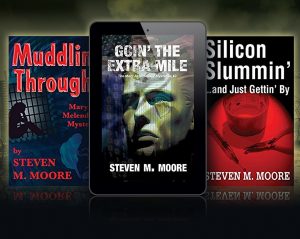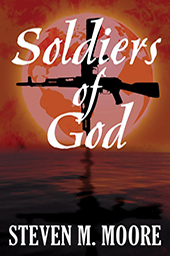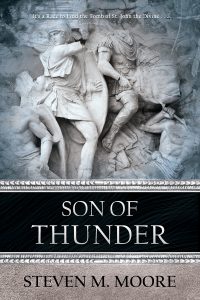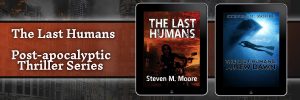[Note from Steve: I’m having way too much fun writing these British-style mysteries to stop now. This one combines the amateur-detective theme of Irish writer Declan O’Hara paired with the professional-detective theme of Scotland Yard’s DS Margaret Bent. Enjoy.]
Poetic Justice
Copyright 2021, Steven M. Moore
Chapter Seven
Maggie wanted to talk to him at her place of work. That was convenient, because Declan had just had a traditional English breakfast at The Golden Goose as a reward for a mostly sleepless night and to receive some good medicine to work against stress.
He’d visited his father’s workplace often enough, so her office was more or less what he expected, although much cheerier than the room where he’d made his statement with all its bustling activity. The large room with its many desks and computers was busy with plods working on various cases.
She sat at one of those desks because she was only a DS, even though she was SIO for a couple of cases, so she led him back to that interrogation room for some privacy. They sat facing each other.
“Ezra said you seemed nervous, Declan?”
“I was in a hospital because someone tried to kill me. Wouldn’t you be nervous?”
She nodded. “I can have patrol drive by your flat once and a while.”
“That’d be a waste. We have to find out what’s going on. I’m not nervous now. I’m mad as hell.”
She smiled at him. “Actually, that’s good. You’ll be more inclined to help me even more. I notice you said ‘we.’ Is there any chance your encounter with the mad motorcyclist is unrelated to Gilby’s abduction?”
He shook his head in the negative, sending a shock of hair to his forehead that he brushed away. “No, if you’re asking me if I have a secret enemy trying to assassinate me. I do believe that Motorcycle Man might be the same man who kidnapped Gilby. It’s too much a coincidence if not. But I didn’t see his face. He had a helmet on with a dark visor.”
“Opinions expressed in your articles and posts on your website’s blog are strong ones.”
“Mostly not opinions but my interpretations of facts. Here’s what happened, and here’s why it happened, to put a fine point on it.” He gave her a wink. “So you’ve read some?”
“I was curious. I suspect anyone who reads them will react strongly too, pro or con.”
“I’m paid well for the articles. So are many writers. It’s all about content these days. No one I know makes a living writing prose and poetry.”
“I suppose. But your more—shall we say interpretative?—writings have the flaw that no one has a way of determining whether someone who reacts badly to them will want to kill you.”
“You’re not helping to cure my paranoia.”
She shrugged. “In this case, it’s not—”
“—paranoia because it’s true,” he finished.
They laughed together. He liked her laugh. That moment was soon over, and she returned to business.
“Let me try another tact.”
She shoved some stapled papers over to him. It was a list of names.
“What’s this?”
“Something I had Ezra create, a list of Heathrow’s recent clients, criminals he’s got off the hook one time or another, some several times. Do you notice anything unusual?”
He studied the list comprised of five pages of names. The barrister had been a busy man. When he finished, he said, “Seems like there’s a lot of Irish names here. Are you suggesting that Heathrow and his partners are somehow working for an Irish mafia here in London? Does such a thing even exist?”
“Not exactly mafias, but gangs of smugglers. Most of the Irish names and some of the non-Irish, I’m guessing. The border problems you’ve been writing about create many ancillary problems. One is an uptick in smuggling.”
“Here to there, or vice versa?”
“Both. Some people on either side don’t like the rules put in place because of Brexit and try to work their way around them.”
“Just human nature, I suppose. And isn’t smuggling more in the domain of customs, not the Yard?”
“Yes, for the smuggling itself but not for other crimes associated with it.”
“Good Lord, this world is complicated.”
“And leaders like Johnson have made it even more so.”
***
As the discussion continued, Declan realized that Maggie was grasping at straws. Did she only invite me in to look at Ezra’s damn list? He wasn’t keen on the idea that he might be involved somehow in some smuggling activities via Gilby and Babbitt…and the Yard. He wanted his peaceful life back. How can I write when I have to look over my shoulder every time I go out?
Basically she’d forced him to agree to do just that until the Yard made more progress on the case. He thought she might be going down a cul de sac and taking her team with her. Am I supposed to give her company?
He liked the detective. He would help her as much as he could, but he’d much prefer that she consider other possibilities as well. It wasn’t much fun being someone’s target.
After their chinwag ended, she told him to wait. She introduced him to Archimedes and left them alone together.
Declan immediately liked the tall techie who badly needed a haircut. He asked to see the text message on Declan’s mobile. He spent a lot more time than he needed to read it. Trying to parse the meaning? To Declan, that was clear.
“This bloke’s got some tech skills, just like the one sending that message to Gilby. Maggie was hoping I could determine the origin of yours. Maybe I can, but I’ll need some time. Can I borrow your mobile for a while?”
“I use it for work. It’s my laptop away from home. I even read in the Underground with it.”
“Probably more powerful than your laptop even. I can lend you a burner.”
“A what?”
Archimedes smiled. “Smart phone without sim card. No GPS locator. Might be a good idea to improve your security too.”
“What about my contact list?”
“I’ll transfer stuff like that over to the burner. Minus this message, just in case. And I’ll return your mobile in a few days. Deal?”
“Do you think it will help Maggie’s investigation?”
“Maybe. Depends on my luck.”
“Okay. Let’s do it.”
***
When Declan returned to his flat, he discovered a mailer envelope in the hall entrance way that had been shoved under his door. He picked it up with a tissue from his bathroom and took it to his study, almost dropping it because his hand trembled so much. He placed it on his desk.
How do I unseal an envelope without destroying forensics evidence? He wanted to see what was inside. He snapped his fingers. Returning to his bathroom he found the box of rubber gloves he used to clean both his galley kitchen and bathroom. A few years ago, he’d had a rash on both hands, and the doctor recommended the use of rubber gloves. The rash had disappeared; he’d continued to use the rubber gloves so it wouldn’t come back.
Instead of working open the clasp, he used a letter opener to slit the envelope open. Inside was a large photograph. The woman he recognized as Gilby. He assumed the man was Babbitt. They were sitting bound and gagged on back-to-back chairs.
The first question that flooded into his mind was: Why me? The second was related: Why not the police? The final one was: What am I supposed to do with this?
He left envelope and photo on the desk and exited the room to sit on his couch. Fumbling a bit with the unfamiliar mobile Archimedes had provided, he called Maggie. It went to voicemail, so he left a message informing her about the envelope and its contents.
I want this all to end. He wished he’d never seen Gilby’s abduction. Is whoever did it using me as a go-between, a person to funnel information to the Yard. Why not to the SIO herself? He’d heard from his Da that criminals often liked to gloat to the police.
Any romantic aspirations he had harbored for DS Bent were now fading. Won’t any relationship with her bring more of the same? He wondered how his mother had managed with his father. Had he only imagined it to be a loving relationship all those years, a delusion hiding a mother’s fear about her family being affected by the father’s occupation? A content creator and a copper. The more he thought about it, the less he felt good about it.
He was working on his second bottle of Smithwick’s when Ezra and the SOCOs arrived.
Chapter Eight
“I think the first thing you should do is take a picture of the picture with your mobile and send it to Maggie. She’ll find it interesting. I couldn’t manage it with Archimedes’s moby.”
“Will do. I saw you were careful handling it.” Ezra slapped Declan on the back. “Good show, mate. We’ll make a detective out of you yet.”
He went and hovered around the entrance door, kneeling down and sticking a finger under the crack. “Big enough gap here. Somewhere along the line a previous tenant removed a plush carpet to get to the hardwood floors. Always leaves a gap.”
“That would be me. I have some seasonal allergies. Pollen collects in plush carpeting.”
“I hear you. Only problem is that someone could come in under the door with a stiff wire and release the deadbolt. It’s then a simple matter to pick the knob’s lock.”
“Good Lord. Were you a cat burglar?”
“You should see Maggie. Her set of picks is top quality. You’re one of the smart ones. Most people don’t even think ’bout having a deadbolt.”
“I can’t make that claim. I only changed keys when I moved in.”
He laughed and then shrugged. “Not important, mate. With the gap, the scrote didn’t even have to enter.”
“Will that photo help the investigation?”
“We’ll see. At least it tells us Gilby and Babbitt are together and both victims. Maybe we can get something from the background that will give us a clue about where they’re being held.”
“But why send it to me?”
“Who knows? Because you’re such a lovable bloke? Maybe we’ll get one too. Or Gilby’s workplace.”
“Why there?”
“The Yard frowns on paying ransoms. The barristers might spring for that, though, I suppose. Depends on what Gilby and Babbitt know. Or maybe they have some evidence the scrotes would not want us to have? Use your imagination. You’re the writer.”
“Maybe the Met is so big they don’t know where to send it? I just met a woman who used to be in the Yard, an inspector in the Art and Antiques Division. Have you ever heard of that?”
“Can’t say I have. Maybe Maggie has. The bureaucracy is huge. I get your point. You think they’re using you as an intermediary.”
“You’ll need to check, but maybe Heathrow and his lawyer friends aren’t guilty of anything?”
“The scrotes would know about them through Gilby, if only recently. I don’t know what the involvement is, but I’m willing to bet Heathrow and friends are involved in some way. Maggie showed you the list.”
“It was a bit depressing, seeing a bunch of Irish criminals.”
Ezra laughed. “For all we know, the rest were Cockneys. Remember Daddy Doolittle.”
Declan thought a moment and then laughed. The droll constable had a sense of humor.
***
Maggie read through the forensics report. There’d been a bit of dust at the bottom of the envelope that turned out to be scouring powder used to clean sinks and stoves that hadn’t come from Declan’s gloves, which had been out of the box. No fingerprints, no DNA traces.
She asked herself the same question Declan had asked: Why go through the writer? Ezra had told her his theory that they didn’t know where to send the photo to in the Met. She didn’t buy that. And Declan had no connection with Heathrow and his cronies. She saw her whole smuggling theory taking a hard crash landing.
She didn’t buy the ransom theory either, but the idea that somehow those who’d kidnapped Gilby and Babbitt were after incriminating evidence the law firm had was likely. Yet why would Heathrow or anyone in the firm feel pressure with the two kidnapped? Could it all just be a big mistake, the left hand of a criminal operation not knowing what the right hand was doing?
Early days, she said to herself. But the DI wants results! She had to face him in ten minutes. It was time for a cuppa’.
She returned to her desk to find a note from Archimedes. She sighed. She put down her tea, popped a biscuit into her mouth, and then took a sip. She then went to the lift. In the basement, she found the jolly black giant waiting for her.
“Traced Declan’s text message. It came from Kensington. Here’s the address.”
She examined it. It looked familiar.
When she returned to her desk, her tea was cold. She drank it anyway and then pulled the file on Heathrow. He lived in Kensington.
She called the law firm. Arthur Heathrow, Esq., had taken a personal day. She called his home. No answer, no answering machine.
She met Ezra coming in as she was going out. “Just in time. We’ll take a little ride to Kensington. You can tell me about Declan as we go.”
“Just give me time to visit the loo, Guv.”
***
Maggie saw the body on the sitting room floor. She told Ezra to practice his skills at lock-picking this time. Once in the foyer, he handed her gloves and booties.
There wasn’t much blood. She didn’t see the wound until Ezra rolled Heathrow over. A hole in his chest told the sordid tale.
“Blood’s all in his abdominal cavity, I’d wager. I’ll call for a pathologist and SOCOs.”
“Now we have a murder case. The DI will be thrilled, I’m sure. After you call for them, do a quick sweep of the downstairs. I’m off to do the same upstairs.”
Everything was tidy upstairs. One bedroom was in use, probably the barrister’s. A small bookcase mostly contained popular fiction. She noticed one of Declan’s novels, The Case of the Distraught Diva. The subtitle: Inspector Robinson, Book One. Different than Gilby’s, which was more recent. He’d published it six years earlier. The cover was a bit sexy, showing a woman’s bare leg and foot with a high-heeled shoe.
She browsed through it and then put it back and checked the bathroom. Neat and tidy too. Was a cleaning woman here at the house this morning? If so, the SOCOs probably wouldn’t find much.
The other two bedrooms had mattresses with bed sheets and covers folded on top, and chests with empty drawers. The main bathroom, in between those two rooms, looked unused as well. She went downstairs.
“Marks on the rug in the study and dishwasher with clean dishes show a cleaning lady was here,” Ezra said.
“My same conclusion. No biologicals in the study, I presume. He was shot here in the sitting room. He must have known his killer.”
“Because he wasn’t shot through the peephole or in the entrance way?”
“Probably opened the door willingly enough and let his killer in. Say, does he have something in his fist. Careful.”
Ezra had bent to pry the fingers open. He held up a cufflink. “Unusual design, I dare say.” He handed it to her.
“An Irish cross. Probably not his.”
***
Back at the station, Maggie called Declan.
“It’s nice to hear from you, Maggie,” he said, “but I’m sure this isn’t a social call.”
“I’d like to have your father’s phone number.”
“He splits his time between Dublin and Donegal. Let me think. He’d be in Donegal now because a course at the training academy just finished. But I’ll give you both numbers and the home number. Why do you want to call him?”
“I would probably just get a run-around from the Garda if I went through official channels. I need a lesson on Irish crime syndicates.”
“Can’t help you there, but Da probably can. Or knows levers to pull to get you connected with someone who can. Are you looking for someone in a particular place? Irish ports, perhaps?”
“Forget the smuggling. That could just be part of their business model.”
“You seem a bit antsy. What’s happened?”
“Heathrow’s dead. We found him at his home.”
“Um, you plods are gathering all kinds of evidence. How are you going to sort it all? You don’t think my father’s involved, do you?”
“No, of course not. But he’s a valuable source of information I have available through you.”
He gave her the numbers. “You might get Mum, so fair warning: She’s very protective of Da. And her children, for that matter. Thinks he works too hard and that he should retire completely. I tend to back her on that. Man’s over seventy now.”
“Will she put me through if I mention you?”
“If you do, she probably will, thinking you’re my girlfriend. She’s always badgering me about how she wants some grandchildren.”
“Maybe I’ll lead her on a bit. I really need to talk to your father.”
Chapter Nine
The conversation with the old copper Michael O’Hara was brief. He wanted to Skype. They used Zoom instead so Ezra could more easily sit in at his own desk.
“The technological miracles of our age,” Michael O’Hara said after they had everything sorted. “What a boon to policing, right DS Bent?”
“Call me Maggie. DC Ezra Harris is with me, as you can see. Call that old Cockney Ezra. We’re recording, if you don’t mind, and he’s taking notes as well.”
“Good show. I hope my son is okay. I heard his name bandied about before my wife handed the phone over.”
“He’s fine. Just a good friend.” Maggie said nothing about the motorcycle attack. “Down to business.” She held the cufflink close to the computer’s camera lens. “Does this mean anything to you?”
Read the rest of this entry »







